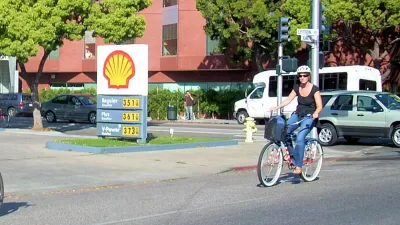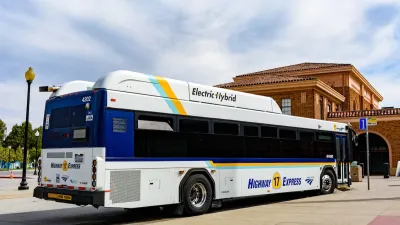Julie Pierce, city of Clayton councilmember, chair of the Contra Costa Transportation Authority, and president of the Association of Bay Area Governments, evaluates the effects of SB 375, California's key land use law to address climate change .
The opening of the editorial:
"I am a city council member, but I am also a regionalist. These are not mutually exclusive titles — each needs the other. Regional governments are built with and depend on the expertise of local officials. Because local government is the level of government closest to the people, we hear firsthand when potholes go unfilled or the garbage is not picked up.
But our residents live in regions. It’s not unusual for someone to make their home in one city but work in a second city, shop in a third and go to a fourth for recreation. Our residents expect their local governments to work together regionally.
Enter SB 375 (Steinberg, Chapter 728, Statutes of 2008), a law that requires a Regional Transportation Plan (RTP) to go beyond existing requirements and meet greenhouse gas emissions reduction targets. Implementing this policy at the regional level made sense to the Legislature because travel patterns could not be addressed on a city-by-city approach; it requires regional cooperation.
SB 375 also recognizes local authority and leverages the symbiotic relationship between local and regional planning. Local plans provide the baseline for all regional plans and investment decisions. Yet at some point, a transportation investment crosses local boundaries: A new bus line is funded, a road is built or a bike lane is created, and the land-use market responds. New homes are built, businesses spring up, and transit and freight routes are altered. Land-use investment drives transportation systems. And transportation investment drives land-use markets."
The article goes on to evaluate the effects of SB 375 according to a number of key considerations.
FULL STORY: The Future of SB 375 Implementation and Regional Planning

Alabama: Trump Terminates Settlements for Black Communities Harmed By Raw Sewage
Trump deemed the landmark civil rights agreement “illegal DEI and environmental justice policy.”

Planetizen Federal Action Tracker
A weekly monitor of how Trump’s orders and actions are impacting planners and planning in America.

The 120 Year Old Tiny Home Villages That Sheltered San Francisco’s Earthquake Refugees
More than a century ago, San Francisco mobilized to house thousands of residents displaced by the 1906 earthquake. Could their strategy offer a model for the present?

Ken Jennings Launches Transit Web Series
The Jeopardy champ wants you to ride public transit.

BLM To Rescind Public Lands Rule
The change will downgrade conservation, once again putting federal land at risk for mining and other extractive uses.

Indy Neighborhood Group Builds Temporary Multi-Use Path
Community members, aided in part by funding from the city, repurposed a vehicle lane to create a protected bike and pedestrian path for the summer season.
Urban Design for Planners 1: Software Tools
This six-course series explores essential urban design concepts using open source software and equips planners with the tools they need to participate fully in the urban design process.
Planning for Universal Design
Learn the tools for implementing Universal Design in planning regulations.
Clanton & Associates, Inc.
Jessamine County Fiscal Court
Institute for Housing and Urban Development Studies (IHS)
City of Grandview
Harvard GSD Executive Education
Toledo-Lucas County Plan Commissions
Salt Lake City
NYU Wagner Graduate School of Public Service




























